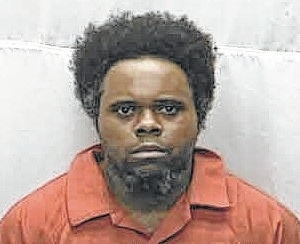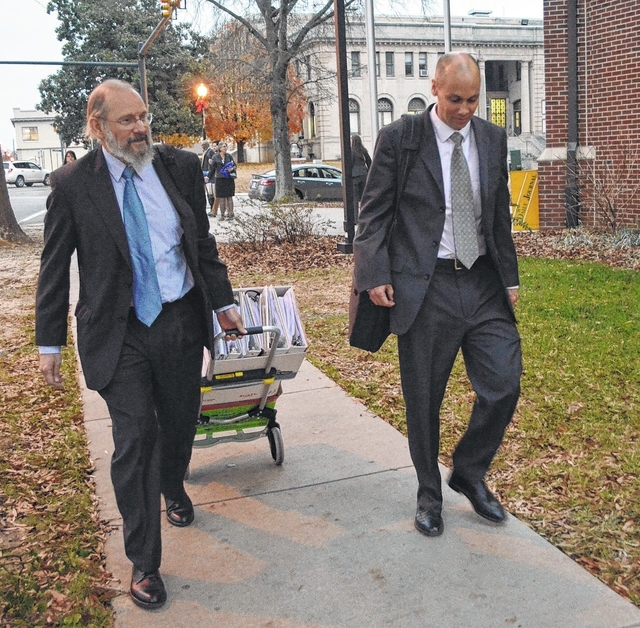ROCKINGHAM — A man serving life in prison after being convicted of first-degree murder as a teenager could have his sentence changed.
Derrick McRae, represented by the Duke University School of Law Wrongful Convictions Clinic, was in court Wednesday for a judge to hear motions related to a resentencing hearing to be held sometime in the future.
McRae, now 37, was tried twice in three weeks and convicted in the 1995 murder of Jeremy Lee Rankin and sentenced to life in prison without parole, despite the lack of physical evidence linking him to the crime. The first trial resulted in a hung jury, with eight jurors voting not guilty.
A recent U.S. Supreme Court decision regarding the constitutionality of automatic life without parole sentences for juvenile defendants spurred the latest legal action, according to defense attorney Jamie Lau.
In Louisiana v. Montgomery, the Court reversed a decision by the Louisiana Supreme Court which did not retroactively apply the Court’s 2012 decision in Miller v. Alabama.
“Miller’s conclusion that the sentence of life without parole is disproportionate for the vast majority of juvenile offenders raises a grave risk that many are being held in violation of the Constitution,” Justice Anthony Kennedy wrote in the majority opinion. “Giving Miller retroactive effect, moreover, does not require States to relitigate sentences, let alone convictions, in every case where a juvenile offender received mandatory life without parole.”
The opinion went on to read that state’s can remedy a Miller violation by permitting juvenile homicide offenders to be eligible for parole, rather than by resentencing them.
“Allowing those offenders to be considered for parole ensures that juveniles whose crimes reflected only transient immaturity — and who have since matured — will not be forced to serve a disproportionate sentence in violation of the Eighth Amendment,” Kennedy continued.
The Eighth Amendment prohibits the federal government from imposing excessive bails or fines or cruel and unusual punishment.
“In light of what this Court has said in Roper, Graham, and Miller about how children are constitutionally different from adults in their level of culpability, however, prisoners like Montgomery must be given the opportunity to show their crime did not reflect irreparable corruption; and, if it did not, their hope for some years of life outside prison walls must be restored,” the opinion concludes.
Lau represented McRae in an evidentiary hearing in late 2014 following the filing of a motion for appropriate relief filed the previous year, with the goal of having his conviction overturned.
The attorney said resentencing was mentioned in the 2013 motion, but wasn’t dealt with during the hearing as they were awaiting the Court’s decision the Montgomery case.
During the 1998 trials, prosecutors relied on testimonies from Edward Tender and Thurman Nelson, the latter of whom was arrested along with McRae for the murder. Tender had said McRae confessed to him while in jail.
When interviewed by representatives of the Duke team leading up to the hearing, Tender recanted his original testimony. However, when put on the stand in 2014, Tender was unable to read his original testimony or recantation and said he had so many people asking him about the case that he “might have told ‘em anything just to get them out of my hair.”
During the three-day hearing, Lau argued that witness statements made to police that were used to arrest McRae were never used at trial and that original defense attorney George Crump was never privy to that information.
Lau also suggested that deals were made to reduce criminal charges against Tender and Nelson, although Brewer and former District Attorney Michael Parker, chief assistant DA at the time, denied knowledge of any bargains.
Brewer and Parker testified that then-District Attorney Ken Honeycutt was the only person allowed to cut deals.
It wasn’t mentioned during the hearing, but Brewer and Honeycutt were brought up on charges of prosecutorial misconduct for “lying, cheating and withholding evidence in a murder trial” by the North Carolina State Bar in a 1996 case in Union County.
They were accused of hiding a plea deal and altering documents “concerning the deal when submitting material to a judge.” However, the charges were dropped because defense attorneys “did not file their complaint against the prosecutors in time.”
In addition to no evidence against him, McRae also had an alibi. Several witnesses originally testified that they had seen McRae so drunk at a party the same day of the murder that he had to be carried home.
In a post-hearing brief, Lau called McRae’s trials “a tragic rush to injustice,” pointing out that Brewer did not have sufficient time to prepare for the case.
McRae had been declared competent to stand trial, after two years of the opposite result, on the first day of his first trial. After a hung jury, the state rushed a retrial during the limited window of his competency.
Judge William David Lee — senior resident superior court judge for Union County — denied the motion in early 2015.
Kim McCall, McRae’s aunt, spoke out about her nephew’s situation during a rally at the old courthouse earlier this week.
“I can’t imagine having my life taken from me for something I did not do,” she said. “And then the fact that he never took a plea because he was innocent, that speaks volumes.”
No date has been set for McRae’s next court appearance.
Reach William R. Toler at 910-817-2675 and follow him on Twitter @William_r_toler.


